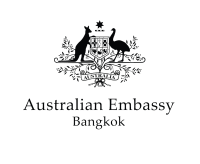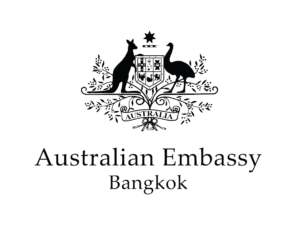Ambassador McKinnon shared this opinion piece on “COVID-19, Australia and Thailand: We are in this together”, published on Prachachart Turakij newspapers.
The full content of the Op-Ed in English is as followed:
Many years ago, former Australian Prime Minister Sir Robert Menzies said ‘it’s a good thing to be a friend by treaty, but it’s a better thing to be friends in the heart, in the spirit, and in the mind’. He was talking about Thailand when he said that.
As Australia’s Ambassador to the Kingdom of Thailand, many decades after those famous words were uttered, I’m struck by how that sentiment still holds true today. Particularly in such challenging times.
Australians and Thais alike have been alarmed as the COVID-19 pandemic spread across the world. The virus has exacted a heavy toll in terms of lives lost and the devastating economic cost.
Our two countries have weathered the COVID storm better than most. In fact, according to the Global COVID-19 Index, Australia and Thailand are ranked number 1 and number 2 respectively in recovery response. This bears testament to the hard, but necessary, decisions leaders in Bangkok and Canberra took to shut down our communities. These decisions required us all to make sacrifices, but positioned us well for the recovery phase.
Australia and Thailand have a shared stake in defeating COVID-19 in our region. Australia has remodelled our development cooperation program under the banner “Partnerships for Recovery”, investing over $280 million to fight COVID-19 in the Indo-Pacific, as well as $352 million towards global efforts to identify, test and develop a COVID-19 vaccine. We have also pledged an additional $300 million to Gavi, the global vaccine alliance. While Thailand has led the region in the creation of the ASEAN Response Fund, to which Australia will also contribute.
In cooperating to combat COVID-19, Australia sees an opportunity to work even more closely with Thailand. We are already funding a new 30 million baht program to support Thai border officials – workers at the front line of the pandemic – to protect Thailand from cross-border threats. Australian scholarships will support Thai doctors to study epidemiology in Australia – training that will help Thailand tackle COVID-19 and prepare for future crises.
Our two governments have also worked closely together to help hundreds of stranded Australians and Thais return to their respective countries. It has been gratifying to help reunite our citizens with their loved ones, where they can enjoy the comforts of home.
In addition to such close bilateral cooperation, Australia and Thailand are working together on the global stage. We both supported a World Health Assembly resolution calling for an independent review of COVID-19. Australia was one of several countries that led the push for a review.
This resolution commits to an impartial, independent and comprehensive evaluation into COVID-19. The world community needs to understand why and how the outbreak began. We must work collectively to ensure it doesn’t happen again. The resolution provides a clear mandate to identify the source of COVID-19 to reduce the risks of similar new viruses emerging.
A record 145 countries signed up as co-sponsors of the resolution. It was truly a global moment of consensus. Regrettably, the pandemic has also highlighted some of the darker aspects of state behaviour. Recently Australia and Thailand co-signed with 130 other countries and observers a UN statement warning that COVID-19 had “created conditions that enabled the spread of disinformation, fake news and doctored videos to foment violence, to divide communities”.
Some countries have used the pandemic as cover to spread disinformation and lies. The European Commission issued a report last week that concluded foreign actors and countries – naming Russia and China – had carried out targeted disinformation campaigns seeking to undermine democratic debate and exacerbate social polarisation, while improving their own image.
A day later, Twitter disclosed over 32,000 accounts as state-linked information operations, which the company attributed to Russia, China and Turkey.
To defeat COVID-19, we need to work together. Spreading fake news and misattributing blame over the virus’ origin only serve to undermine a sense of shared purpose.
We want to work together with Thailand to revitalise our economies: to maintain supply chains, reinvigorate trade in goods and services, and eventually to re-open international travel so tourists, families, businesspeople and students can again travel freely between our countries.
The student market is particularly important to Australia and we are exploring how international students, including Thais, will be able to return to Australia. Recent claims from the Chinese Government that Chinese tourists and students should reconsider travelling to Australia because of the risk of racism are the very definition of fake news.
Australia is one of the world’s safest countries. It is the world’s most successful multicultural country. Australia welcomes students and visitors from all countries – including 260,000 Chinese student enrolments in 2019 alone – and their experiences are overwhelmingly enriching and positive.
Through COVID-19 we have seen some of the best the human spirit has to offer – we have all made small personal sacrifices and watched others, like frontline health workers, make far greater ones. But the challenge is not over and we will need to continue to draw on this spirit, as well as the cooperation and discipline that countries such as Thailand and Australia have demonstrated so far.



